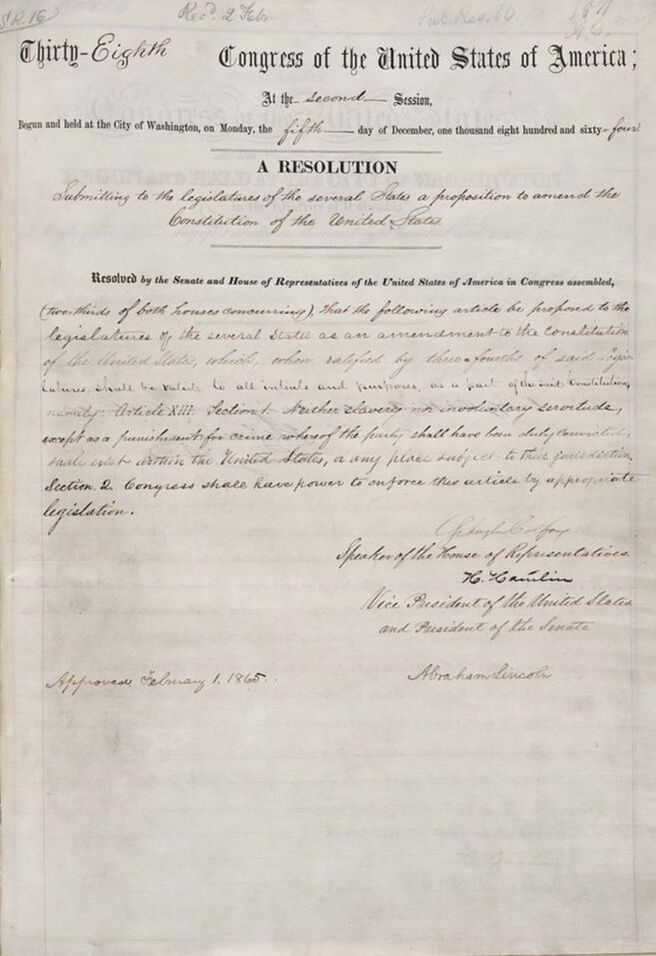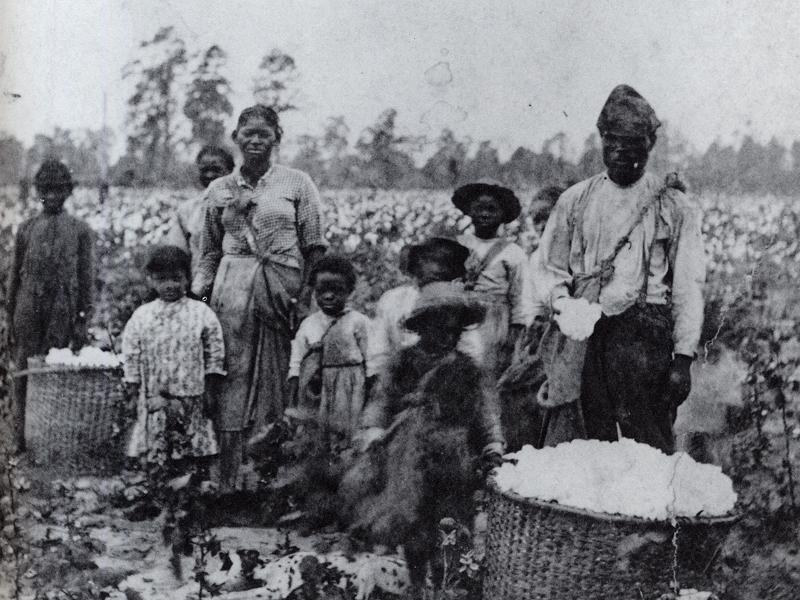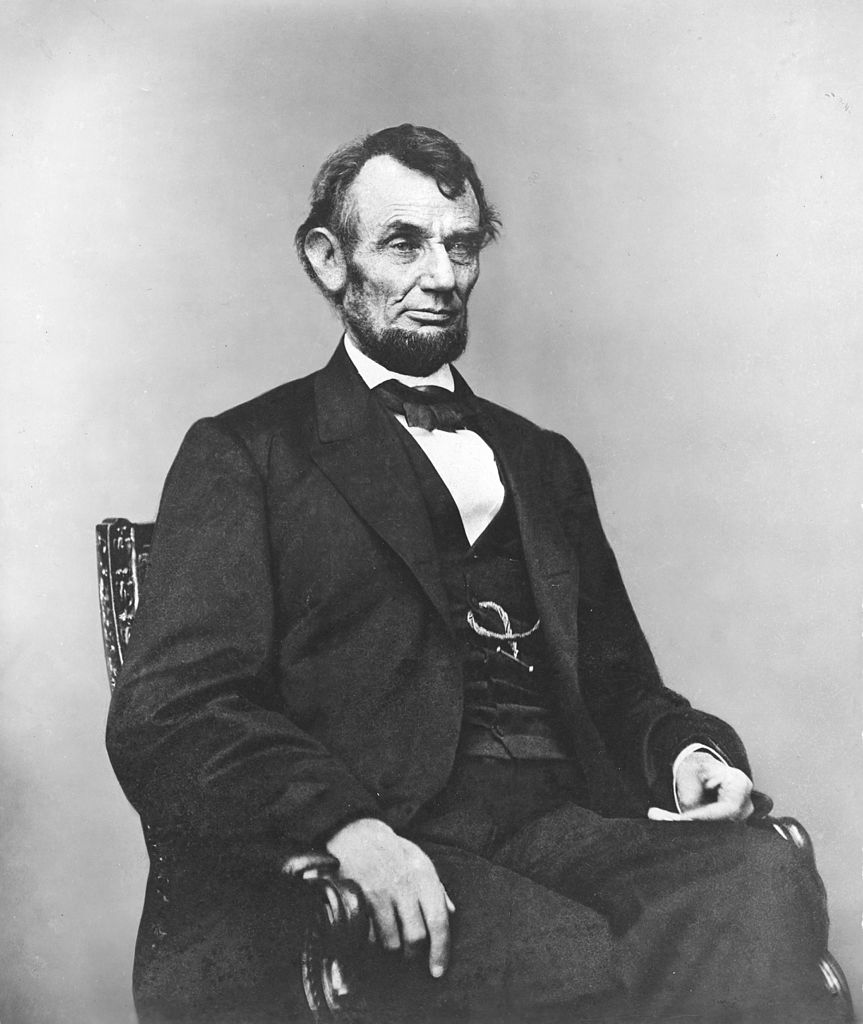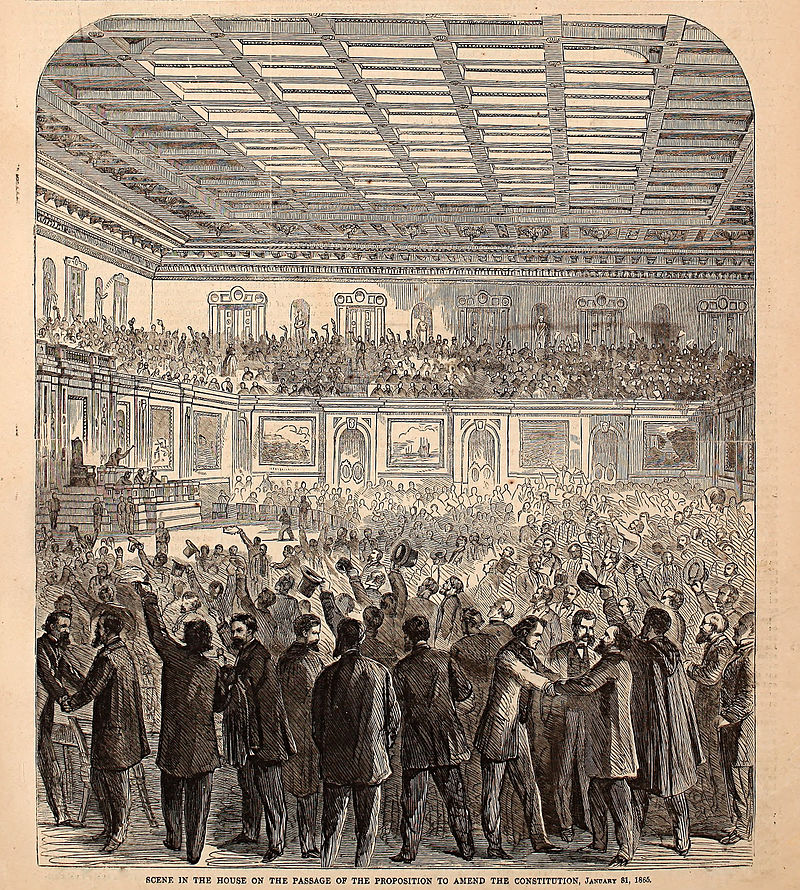THIRTEENTH AMENDMENT OF THE
UNITED STATES CONSTITUTION
The Thirteenth Amendment of the United States Constitution is one of the most significant events in American history from the 19th century. It is especially important in relation to the history of slavery in the United States and the events of the American Civil War. This is because the Thirteenth Amendment abolished slavery in the United States when it was ratified in 1865. The Thirteenth Amendment is also significant in relation to the Fourteenth Amendment and the Fifteen Amendment of the American Constitution. Together, the three amendments are often referred to as the ‘Reconstruction Amendments’ since they dealt with issues resulting from the end of the American Civil War and the period of Reconstruction in the United States.
SLAVERY IN THE UNITED STATES BEFORE THE THIRTEENTH AMENDMENT
Slavery in the United States existed from the period of Colonial America in the early 17th century until the events of the American Civil War, which lasted from 1861 until 1865. Throughout this timeframe, many slaves were brought from Africa to the territory of the United States via the Atlantic Slave Trade. Many of these slaves ended up working on plantations and households across the United States, and played a significant role in the production of certain goods. However, slavery in the United States came into question in the 19th century due to the growth of the American Abolitionist Movement.
The American Abolitionist Movement is the name for the advancements made in the United States towards ending the practise of slavery. For instance, the term ‘abolition’ means to stop or end something. As such, an abolitionist is someone who was working to ban slavery. The American Abolitionist Movement is considered to have occurred from the late 1700s until 1865 when the American government abolished slavery following the end of the American Civil War.
AMERICAN CIVIL WAR & THE EMANCIPATION PROCLAMATION
The American Civil War first began in 1861 and continued until 1865. It was one of the most significant events in all of American history and had a profound impact on the development of the United States. At its heart, the American Civil War was the result of growing tensions between the Northern states and Southern states on the issue of slavery, among other things. In general, the American Civil War involved the Northern states (also referred to as the ‘Union’) and the Southern states (also referred to as the ‘Confederacy’) fighting in many different major and bloody conflicts. However, another important event that occurred during this time that was significant to the American Abolitionist Movement was the Emancipation Proclamation.
|
In short, the Emancipation Proclamation was an executive order issued by United States President Abraham Lincoln in regards to the issue of slavery in the Confederate States. Lincoln issued the Emancipation Proclamation on September 22nd, 1862, and it became effective as of January 1st of 1863. It declared that all slaves held in Confederate States were free. While the Civil War was not over yet, it essentially gave freedom to any slaves that were able to escape captivity in the Confederate States. This was an important step in the Abolitionist Movement as it foreshadowed the end of slavery that was to occur at the end of the Civil War. The violence and bloodshed of the American Civil War continued until 1865 when the Civil War ended with the surrender of the Confederate Generals. For example, most historians view the end of the Civil War as April 9th, 1865. This is when Confederate General Robert E. Lee surrendered to Union General Ulysses S. Grant at the Battle of Appomattox Court House. The end of the American Civil War was significant in the history of slavery in the United States because it essentially led to the end of the practise and resulted in freedom for over four million African American slaves.
|
PASSAGE OF THE THIRTEENTH AMENDMENT
As stated above, the Thirteenth Amendment of the United States Constitution abolished slavery in the United States. Many lawmakers believed it necessary to abolish slavery as a means of reuniting the Northern and Southern states following the destruction of the American Civil War. For instance, while the earlier Emancipation Proclamation limited the practise of slavery, it did not put a full end to the practise. In fact, throughout 1863 and 1864 there were several proposals from lawmakers in the House of Representatives and the Senate. For instance, the Senate passed the amendment on April 8th of 1964. However, on June 15th of the same year, the House of Representatives voted against it due to Democrats, who disagreed with the amendment.
|
Following the first failure of the amendment, Northern Republicans argued publicly for the need to end slavery in the United States. More specifically, they argued against slavery on moral and religious grounds. On the other hand, Southern Democrats argued an opposing viewpoint and believed that states should have the right to choose for themselves. Regardless, President Abraham Lincoln urged his cabinet to make the abolishing of slavery a main priority following his 1864 re-election as President of the United States. Eventually, on January 31st of 1865, the House of Representatives voted on the amendment again. This time it passed with a vote of 119 to 56.
Following its passage in the Senate and the House of Representatives, the Thirteenth Amendment then needed to be ratified by the states. For instance, by the end of January 1865 it had been ratified by 18 different states. This means that those states had voted on it and agreed to the terms of the amendment. However, the abolishment of slavery remained a controversial issue in some states and the assassination of Abraham Lincoln on April 15th, 1865 delayed the process. However, the next President, Andrew Johnson, made abolishing slavery a priority of his government.
|
As such, the Federal government pushed for the ratification of the amendment by the states. In fact, for the amendment to be approved, it had to be ratified by three fourths of the states. However, some of the Southern states did not support ratification due to fears that it would allow African Americans civil rights. In fact, many of the Southern states did not support the idea of newly freed slaves having the right to vote and rejected the notion that the Federal government could force it upon the states. As such, some states agreed to the terms of the Thirteenth Amendment on the basis that the Federal government could not enforce this upon them. For instance, North Carolina and Georgia ratified the amendment in early December, which gave it the necessary majority for it to become part of the Constitution. As such on, December 18th in 1865, the Thirteenth Amendment of the United States Constitution had been adopted.
TEXT OF THE THIRTEENTH AMENDMENT
- Section 1 - Neither slavery nor involuntary servitude, except as a punishment for crime whereof the party shall have been duly convicted, shall exist within the United States, or any place subject to their jurisdiction.
- Section 2 - Congress shall have power to enforce this article by appropriate legislation.
IMPACTS OF THE THIRTEENTH AMENDMENT
The Thirteenth Amendment had several main impacts on the United States in the time after the end of the Civil War. First, it immediately freed any slaves who had not been freed earlier by the Emancipation Proclamation. For the most part, these were slaves that were held in the border states that were not originally covered in the Emancipation Proclamation. Second, the passage of the Thirteenth Amendment led to the establishment of ‘Black Codes’ throughout many of the Southern states. Although slavery had been abolished, racism remained an ever-present problem in the South. As such, several Southern states passed laws that are commonly referred to as ‘Black Codes’ as a way of controlling the societal, political and economic activities of African Americans. In fact, the Black Codes were attempts by some states to continue with aspects of slavery after the passage of the Thirteenth Amendment. Finally, the passage of the Thirteenth Amendment led to the later Fourteenth and Fifteenth Amendments, which are also referred to as the ‘Reconstruction Amendments’. This is because they dealt with the Reconstruction Era in the United States following the American Civil War.
CITE THIS ARTICLEAUTHOR
|
|




